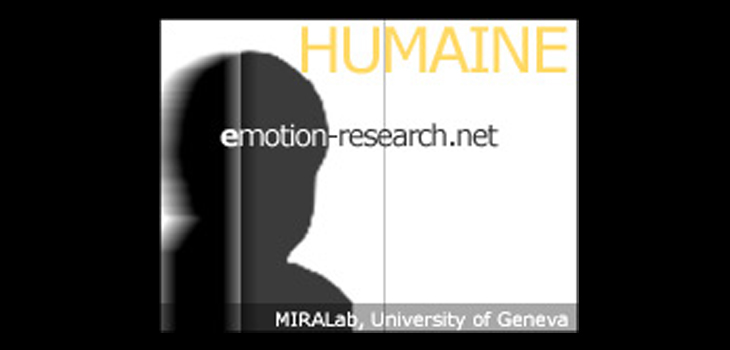
HUMAINE – “Human-Machine Interaction Network on Emotion”
Overview
HUMAINE aims to lay the foundations for European development of systems that can register, model and/or influence human emotional and emotion-related states and processes – ‘emotion-oriented systems’. Such systems may be central to future interfaces, but their conceptual underpinnings are not sufficiently advanced to be sure of their real potential or the best way to develop them. One of the reasons is that relevant knowledge is dispersed across many disciplines. HUMAINE brings together leading experts from the key disciplines in a programme designed to achieve intellectual integration. It identifies six thematic areas that cut across traditional groupings and offer a framework for an appropriate division of labour – theory of emotion; signal/sign interfaces; the structure of emotionally coloured interactions; emotion in cognition and action; emotion in communication and persuasion; and usability of emotion-oriented systems. Teams linked to each area will run a workshop in it and carry out joint research to define an exemplar embodying guiding principles for future work in their area. Cutting across these are plenary sessions where teams from all areas report; activities to create necessary infrastructure (databases recognising cultural and gender diversity, an ethical framework, an electronic portal); and output to the wider community in the form of a handbook and recommendations of good practice (as precursors to formal standards).
MIRALab’s contribution
MIRALab will perform research in the effect of personality and emotions on virtual humans through facial and body animations. Also, MIRALab will develop tools for easier construction and editing of realistic individualized body motions and provide an easy interface with systems that control face and body motions.
Partners
MIRALab, University of Geneva
Switzerland
www.miralab.ch
Centre National De La Recherche Scientifique
Paris, France
www.cnrs.fr/index.html
Deutsches Forschungszentrum für Künstliche Intelligenz GmbH
Germany
www.dfki.de/web/index.en.html
Ecole Polytechnique Féderale de Lausanne, Virtual Reality Laboratory (VRLab)
Switzerland
vrlab.epfl.ch
France Télécom SA
Paris, France
www.francetelecom.com/en/
Friedrich-Alexander-Universität Erlangen-Nürnberg
Germany
www.uni-erlangen.org/
Herriot-Watt University
UK
www.hw.ac.uk/
Imperial College of Science, Technology and Medicine
London, UK
www.imperial.ac.uk/
Inesc Id – Instituto de Engenharia de Sistemas e Computadores: Investigação e Desenvolvimento, Lisboa
Portugal
www.inesc-id.pt/
Institute of Cognitive Sciences and Technologies
Italy
Institute of Communication and Computer Systems – National Technical University of Athens
Greece
www.iccs.ntua.gr/
Instituto Superior Técnico, Lisbon
Portugal
www.ist.utl.pt/en/
Istituto Trentino Di Cultura
Italy
www.itc.it/indexe.aspx
King’s College
London, UK
www.kcl.ac.uk/
La Cantoche Production
Vincennes, France
www.cantoche.com/english/news.html
Österreichische Studiengesellschaft für Kybernetik
Austria
www.osgk.ac.at/
Queen’s University
UK
www.qub.ac.uk/
Royal Institute of Technology in Stockholm
Sweeden
www.kth.se/eng/index.html
T-Systems Nova GmbH
Bonn, Germany
www.t-systems.de/en/Home/templateId=renderStartpage/id=126904.html
Tel Aviv University
Israel
www.tau.ac.il/
Trinity College
Dublin, Ireland
www.tcd.ie/
Università Degli Studi di Bari
Italy
www.uniba.it/index.php
Università Degli Studi di Genova
Italy
www.unige.it/
Universität Augsburg
Germany
www.uni-augsburg.de/english/
Université de Paris VIII
France
www.univ-paris8.fr/
University of Haifa
Israel
www.haifa.ac.il/index_eng.html
University of Hertfordshire
UK
perseus.herts.ac.uk/
University of Leeds
UK
www.leeds.ac.uk/
University of Oxford
UK
www.ox.ac.uk/
University of Sheffield
UK
www.shef.ac.uk/
University of Southern California
USA
www.usc.edu/
University of Twente
The Netherlands
www.utwente.nl/en/
University of Zagreb
Croatia
www.unizg.hr/
